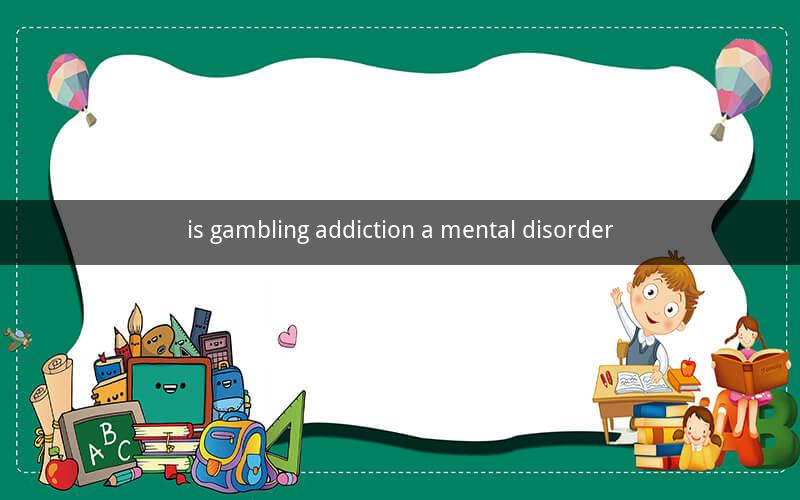
Table of Contents
1. Introduction to Gambling Addiction
2. Defining Mental Disorders
3. Understanding the Connection Between Gambling Addiction and Mental Disorders
4. Common Mental Disorders Associated with Gambling Addiction
5. The Impact of Gambling Addiction on Mental Health
6. Diagnosis and Treatment of Gambling Addiction
7. Prevention and Support for Gambling Addiction
8. Conclusion
1. Introduction to Gambling Addiction
Gambling addiction, also known as gambling disorder, is a behavioral addiction characterized by an uncontrollable urge to gamble despite negative consequences. It affects individuals of all ages, genders, and socioeconomic backgrounds. This section provides an overview of gambling addiction, its prevalence, and its impact on individuals and society.
2. Defining Mental Disorders
Mental disorders, also referred to as mental illnesses, are health conditions that affect a person's mood, thinking, and behavior. They can range from mild to severe and may occur at any stage of life. Mental disorders are complex and can be influenced by various factors, including genetics, environment, and life experiences.
3. Understanding the Connection Between Gambling Addiction and Mental Disorders
The relationship between gambling addiction and mental disorders is well-documented. Research indicates that individuals with gambling addiction are at a higher risk of developing mental disorders, and vice versa. This section explores the underlying factors that contribute to this connection.
4. Common Mental Disorders Associated with Gambling Addiction
Several mental disorders are commonly associated with gambling addiction. These include:
- Anxiety disorders: Individuals with gambling addiction may experience heightened anxiety, which can exacerbate their urge to gamble.
- Depression: Depression is often a precursor to gambling addiction, as individuals may turn to gambling as a form of self-medication.
- Bipolar disorder: People with bipolar disorder may engage in impulsive behaviors, including gambling, during manic episodes.
- Personality disorders: Certain personality disorders, such as antisocial personality disorder, may contribute to the development of gambling addiction.
- Substance use disorders: Individuals with substance use disorders may be more susceptible to developing gambling addiction due to the overlapping addictive behaviors.
5. The Impact of Gambling Addiction on Mental Health
Gambling addiction can have severe consequences on an individual's mental health. It can lead to increased stress, anxiety, depression, and other mental health issues. This section discusses the various ways in which gambling addiction affects mental health.
6. Diagnosis and Treatment of Gambling Addiction
Diagnosing gambling addiction involves identifying specific symptoms and patterns of behavior. Treatment for gambling addiction may include cognitive-behavioral therapy, medication, support groups, and other interventions. This section provides an overview of the diagnostic criteria and treatment options for gambling addiction.
7. Prevention and Support for Gambling Addiction
Preventing gambling addiction involves raising awareness about the risks and promoting healthy gambling habits. Support for individuals with gambling addiction can come from various sources, including family, friends, and professional organizations. This section discusses strategies for prevention and support.
8. Conclusion
Gambling addiction is a complex mental disorder that can have severe consequences for individuals and their loved ones. Understanding the connection between gambling addiction and mental disorders is crucial for effective diagnosis, treatment, and prevention. By addressing the underlying factors and providing appropriate support, we can help individuals overcome gambling addiction and improve their mental health.
Questions and Answers:
1. What is the most common mental disorder associated with gambling addiction?
Answer: Anxiety disorders are the most common mental disorder associated with gambling addiction.
2. Can gambling addiction be treated?
Answer: Yes, gambling addiction can be treated with various interventions, including therapy, medication, and support groups.
3. Is it possible for someone to develop gambling addiction without any underlying mental health issues?
Answer: While it is less common, it is possible for someone to develop gambling addiction without any underlying mental health issues.
4. How does gambling addiction affect a person's social life?
Answer: Gambling addiction can lead to strained relationships, financial problems, and other social issues.
5. What role does genetics play in the development of gambling addiction?
Answer: Genetics can play a role in the development of gambling addiction, as certain genetic factors may increase an individual's susceptibility to addiction.
6. Can medication help treat gambling addiction?
Answer: Medication can be used as part of a comprehensive treatment plan for gambling addiction, particularly to address co-occurring mental health issues.
7. Are there any support groups available for individuals with gambling addiction?
Answer: Yes, there are various support groups available for individuals with gambling addiction, such as Gamblers Anonymous.
8. How can someone determine if they have a gambling addiction?
Answer: Individuals can assess their gambling behavior using the diagnostic criteria outlined in the Diagnostic and Statistical Manual of Mental Disorders (DSM-5).
9. Can gambling addiction be prevented?
Answer: Yes, gambling addiction can be prevented by promoting healthy gambling habits, raising awareness about the risks, and providing education on responsible gambling.
10. How can family and friends support someone with gambling addiction?
Answer: Family and friends can support someone with gambling addiction by offering empathy, understanding, and encouragement. They can also encourage the individual to seek professional help and attend support groups.